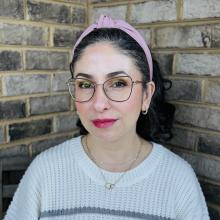Bio:
Natalia Palacios is Associate Professor of Education in the Educational Psychology: Applied Developmental Science Program at the University of Virginia’s School of Education and Human Development. She earned her Ph.D. in Human Development and Social Policy from Northwestern University. Dr. Palacios’s research examines the familial and instructional processes that support the development and success of Latinx children, with a focus on recognizing and integrating cultural and linguistic assets into educational settings. By employing both quantitative and qualitative methods, her work provides insights into teacher-family dynamics and the academic and socio-emotional developmental trajectories of English learners and immigrant children. Her findings have been published in leading journals such as Child Development, Child Development Perspectives, and Developmental Psychology. Her current work is funded by the Spencer Foundation and the William T. Grant Foundation. With over two decades of involvement in SRCD, Dr. Palacios has held several leadership roles, including Co-Chair of the Student and Early Career Council. She has also served on the Task Force on Publications and Ethical Behavior. She is currently a member of the SRCD Publications Committee and serves as Member-at-Large in the Governing Council within SRCD.
Have you recently or do you currently serve on any SRCD Committees, Councils, or task forces?
Yes: Member-at-large Governing Council; Publications committee
Do you have a mentor or mentors who have been instrumental to your career and, if so, who and how?
I have been fortunate to have many generous mentors at different stages of my career. As an undergraduate at Brown, Dr. Cynthia García Coll was a key mentor who shaped my understanding of how to study immigrant families and developmental processes in context. At a time when most studies grouped children into broad racial and ethnic categories—such as “Hispanics” or “Latino”—Dr. García Coll insisted on studying immigrant children within specific ethnocultural groups, recognizing that the context of migration, reception, and settlement mattered deeply. As a graduate student at Northwestern, mentors like Drs. Lindsay Chase-Lansdale and Greg Duncan, were foundational in my development as a scholar—they set high standards and challenged us to question our assumptions and consider the policy implications of our work. Later, colleagues and collaborators—including those who invited me into interdisciplinary projects and encouraged me to pursue ambitious funding opportunities—have modeled what it means to be both rigorous and relational in this work. I feel privileged to have received wonderful mentorship that serves as a model for how I engage with my mentees.
What advice would you give to a grad student beginning their Ph.D. studies in developmental science or related field?
Graduate school is not just about building expertise—it’s about finding your scholarly voice and community. I encourage students to be intentional about cultivating networks of support, including mentors, peers, and collaborators. Stay open to learning across methods and disciplines, and don’t lose sight of why you came into the field in the first place—this passion will sustain you and is instrumental to your persistence.
Hobbies?
I love reading contemporary fiction with my book clubs and enjoying theater with my family—from Broadway and the WestEnd, to regional theater, to local high school productions. I also enjoy traveling, especially to reconnect with family in Colombia and to experience other cultures through food, art, and daily life. For a positive spin on being the parent of a teen, I enjoy my part-time job of driving my son to and from his many commitments.
